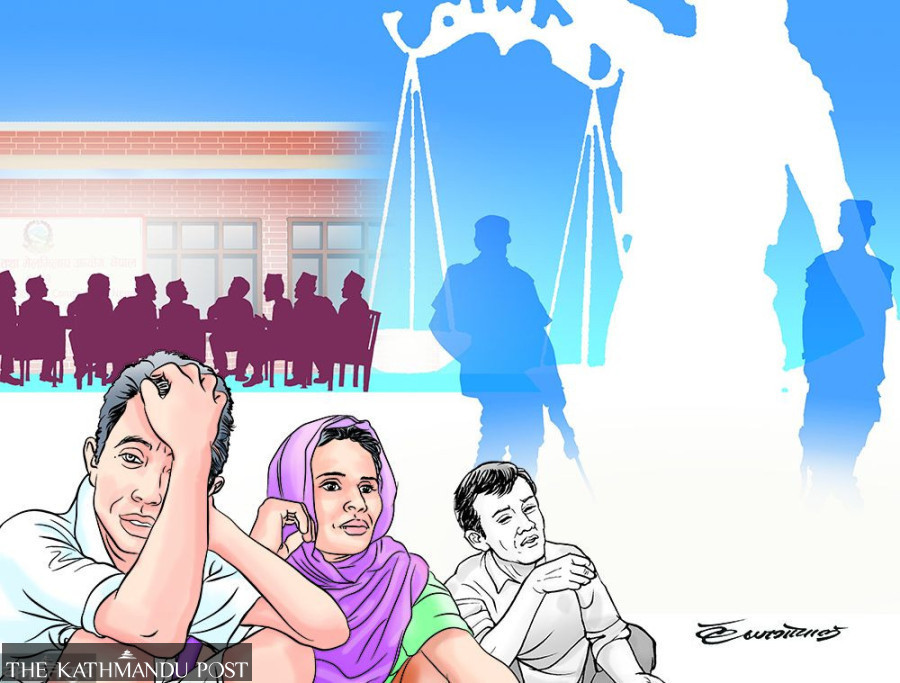National
Rights group slams gaps in transitional justice revision bill
Accountability Watch Committee calls for key changes to ensure respect for victims’ rights and judicial independence.
Post Report
The Accountability Watch Committee, a rights group, on Friday said the bill to amend the Disappearances Enquiry, Truth and Reconciliation Commission Act contains serious errors. In a statement, the committee urged the authorities concerned to address the issues before the bill is endorsed by the federal parliament.
The statement jointly issued by the group’s coordinator Raju Prasad Chapagain, its office bearers and members, said that it was crucial to ensure a conducive environment for a sustainable and legitimate resolution of the transitional justice process.
The group has called for amendments to various provisions in the bill, including those related to the definition and classification of human rights violations.
The group said the Law, Justice, and Human Rights Committee of the House of Representatives made changes to the provision granting the Office of the Attorney General and other bodies under the office the right to determine the penalty.
While describing the consensus on transitional justice forged between the three major political parties as a positive development, the group said that the new arrangement should not encourage impunity.
“While it is positive that the three major parties have come together to conclude the transitional justice process, the proposed amendments are problematic,” read the statement.
It also urged national and international groups to express their concern about transitional justice to help conclude the process in a victim-friendly and sustainable way.
The three-party taskforce to finalise the draft bill agreed to list rape or serious cases of sexual violence, intentional or arbitary killing, enforced disappearances and inhumane or cruel torture as serious violations of human rights thus non-amnestiable. Rest of the cases fall as human rights violations and are amnestiable.
The three parties have also agreed to include a provision which says that in cases other than serious violations of human rights, there can be reconciliation (between the victim and the perpetrator). According to another point of the agreement, the attorney general cannot be forced to press ahead with a legal case in cases of human rights violations or serious violations of human rights where there has been reconciliation or a recommendation for amnesty.
The taskforce also agreed to reduce sentencing by up to 75 percent except in cases of rape or serious sexual violence.
The group has categorically opposed this provision.
“The provision which gives the attorney general and other government attorneys a mandate to file cases by reducing sentencing up to 75 percent and demanding just 25 percent of punishment is mala fide,” it said. “By infringing the judicial independence, it has wrongly given an authority of reducing sentence to the attorney general who is appointed by the prime minister.”
The rights group further stated that the proposed provision blatantly breaches the universal principle that only an independent judiciary should have the right to determine the punishment based on the crime committed by the individual concerned.
As per the proposed provision, decisions on reduced penalty can be taken after examining whether the perpetrators provide information on the allegations against them, whether they cooperate with the commissions on evidence collection and whether they express remorse for their acts. Similarly, before recommending a reduction in penalty, the commissions need to evaluate whether the perpetrators have apologised to the victims and made commitments not to repeat such acts.
All disqualified Maoist combatants including child combatants, along with the families of security personnel who died or got injured during the insurgency, will get reparation and compensation, as per the agreement. However, the issue of child combatants, which is considered a war crime, along with crimes against humanity and other acts of war crime find no mention in the agreement.
The group has also asserted that the taskforce has failed to address the concerns of victims who have called for making the appointments of the office bearers in the transitional justice bodies transparent.
Meanwhile, the chair of the parliament’s Law, Justice, and Human Rights Committee, on Thursday submitted the bill along with the report prepared by the three-party panel to Speaker Devraj Ghimire. She has asked the Speaker to make arrangements necessary to submit the bill to the next House meeting, which is scheduled for Tuesday.
The major parties are preparing to endorse the bill through the ongoing House session.




 18.12°C Kathmandu
18.12°C Kathmandu













